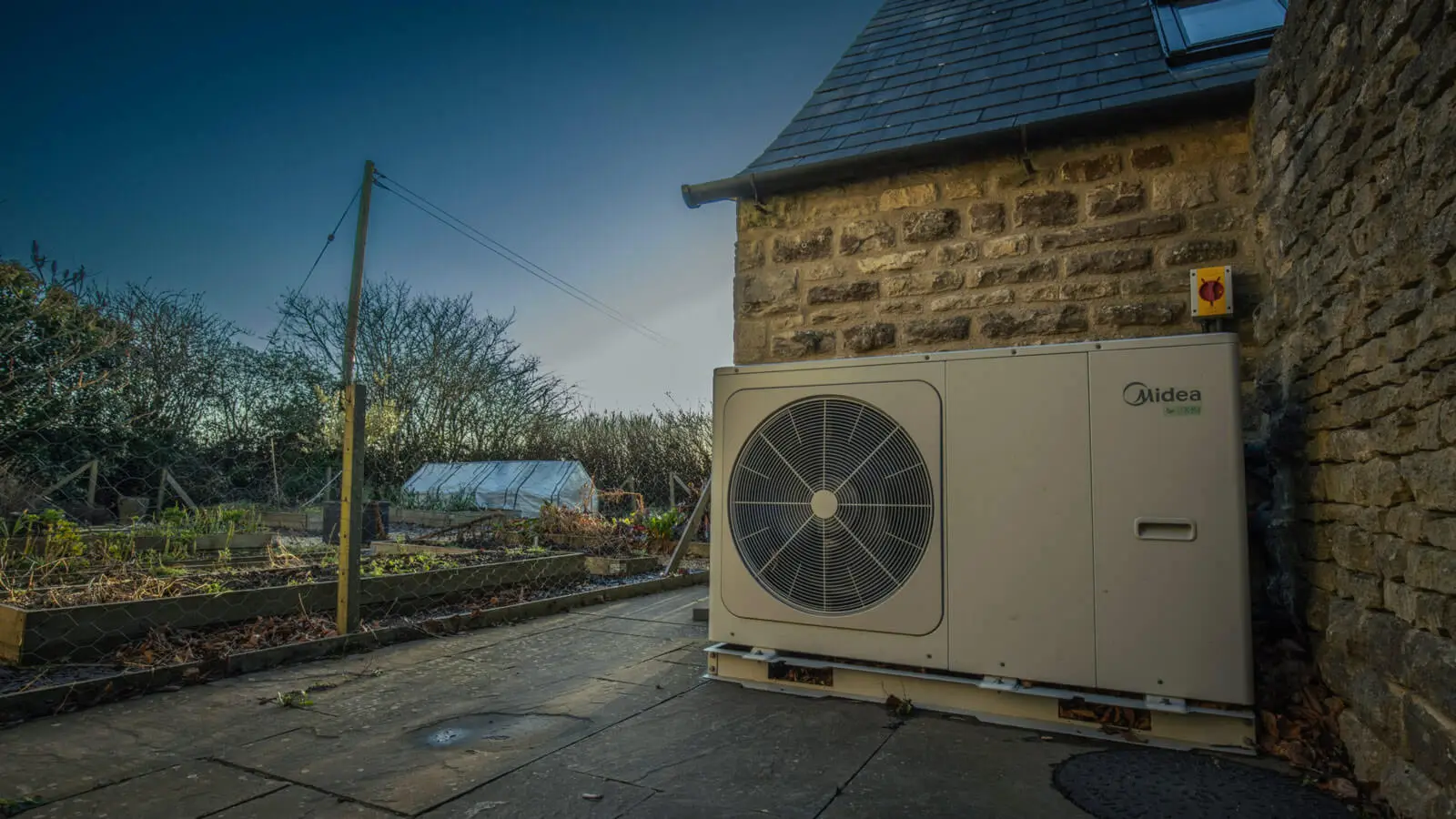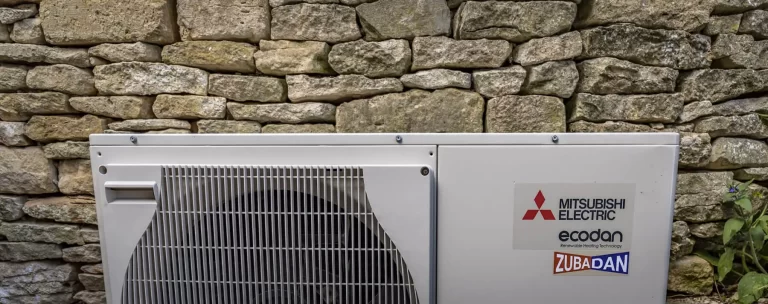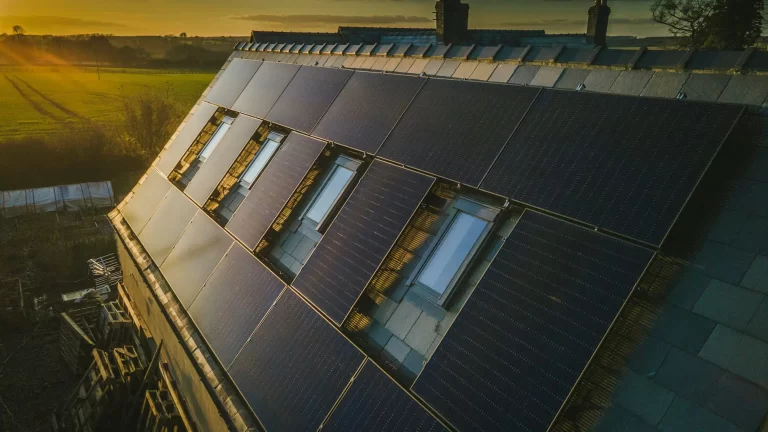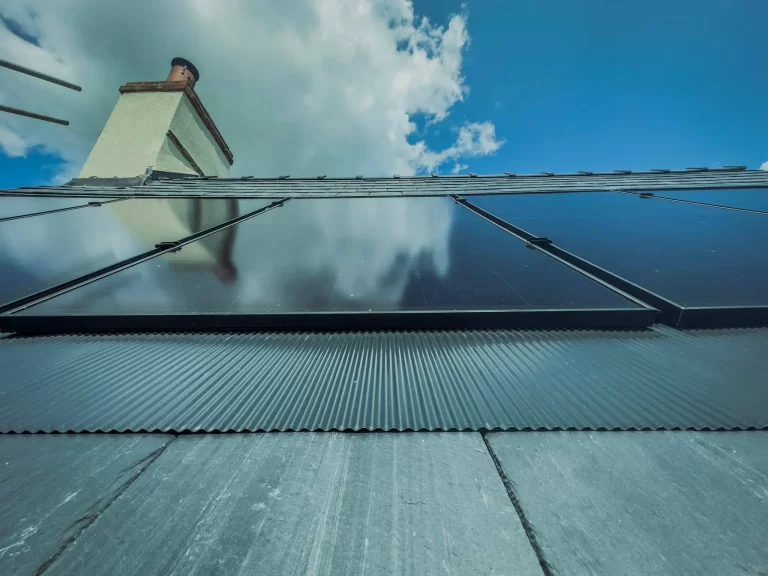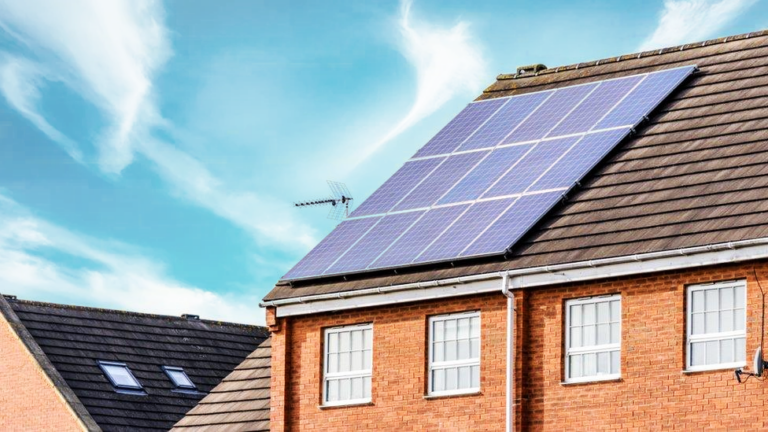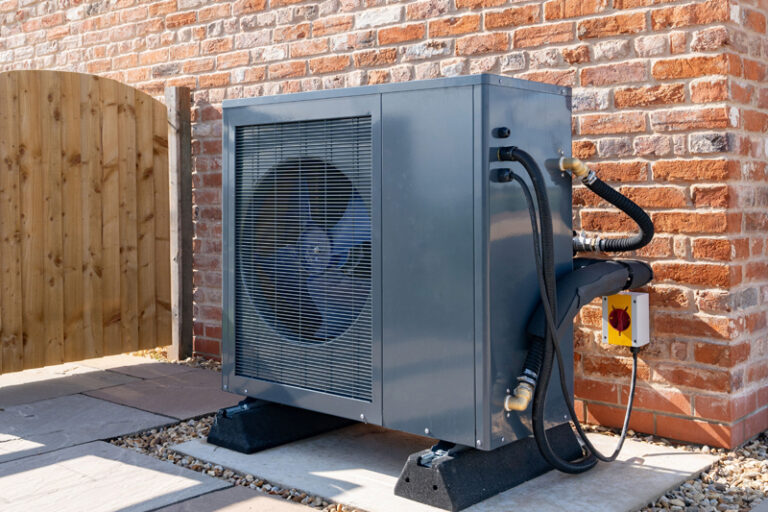Air source heat pumps are growing in popularity as an eco-friendly alternative to traditional heating systems and boilers. Capable of heating both a property’s spaces and its water, they’re well-suited for both homes and businesses looking to reduce their heating bills and carbon footprint at the same time.
But how do heat pumps really work and are they worth the effort in the long run? This guide will help you to understand just why air source heat pumps are being installed in homes all around the country, helping you to decide whether making the switch is right for you.
What Exactly are Air Source Heat Pumps?
An air source heat pump, or ASHP, is an energy-efficient, low-carbon heating system that draws heat energy from the air outside and uses it to keep your home or business premises warm. Air source heat pumps can be used all year round and don’t need to burn fossil fuels to function. Not only are they more environmentally friendly than traditional boilers, but they can help you save a significant amount of money too.
How Does an Air Source Heat Pump Work?
Air source heat pumps work by absorbing heat in the air outside your home before using it to power your central heating and produce hot water. The heat is transferred from the air outside to your indoor heating system using ventilation fans.
Before the heat can be used, it must be passed through a coolant and then compressed to boost its temperature. A heat exchanger will then warm a reserve hot water tank so that the heat can be distributed through your home’s wet system. This means that both your radiators and taps will receive hot water that can be used.
Air source heat pumps can also be used to cool your home. To do this, they essentially reverse the steps described above, decompressing the coolant and reducing its temperature. When passed into the heat exchanger, the coolant takes the heat from your home’s wet system to lower the temperature indoors and releases the heat outside.
Different Types of Air Source Heat Pump Explained
There are two main types of air source heat pump: air to air heat pumps and air to water heat pumps. They both work in a very similar way, but air to water heat pumps are a better solution for meeting all of your home’s heating needs. This is because air to water heat pumps are capable of heating not only the space inside your home, but its water as well. Air to air heat pumps, on the other hand, can only heat your rooms, not your water.
Air to Water Heat Pumps
Since air to water heat pumps can heat both the rooms in your home as well as its water, they require a wet heating system to work. Most homes in the UK have a wet heating system, meaning that water travels through their radiators or underfloor heating to produce heat.
Air to water heat pumps do typically cost more to install than air to air heat pumps, but that doesn’t mean they’re less efficient. In fact, air to water systems are some of the most efficient heating solutions, with efficiency levels that may reach 400% depending on the model and how they’re being used.
One of the main advantages of air to water heat pumps is that you won’t need two separate heating systems to cover both space and water heating. If your home or business premises only needs space heating, an air to air heat pump may be more suitable.
Air to Air Heat Pumps
As mentioned, air to air heat pumps can only heat your home’s rooms and won’t be able to produce hot water. This is because instead of circulating heat using a wet system, they blow hot air into your home using fans instead of warming up radiators.
The biggest advantage of air to air heat pumps is that they’re one of the more affordable heating systems to install. They also have cooling capabilities like air to water heat pumps and can double as an air conditioner when temperatures are high.
The Pros and Cons of Air Source Heat Pumps
To better understand whether making the switch to an air source heat pump is right for you, take a look at the pros and cons of having this type of heating system installed:
Benefits
Air source heat pumps have a huge number of benefits that make them a smart choice compared to traditional boilers. Some of these include:
- Economical and Efficient: Installing an air source heat pump can help you to save money on your energy bills by reducing the amount you spend on heating your home and water. While you will need to use electricity to run your heat pump, the heat itself will come from the air outside, which makes the way that heat is generated much more efficient and cost-effective.
- Both Heating and Cooling: Rather than having two separate systems for heating and cooling, your air source heat pump can handle both. This way you won’t need to pay for installation twice or have to worry about maintaining both an air-conditioning unit and your central heating.
- Space and Water Heating: Choosing an air to water heat pump means that you’ll be able to heat both your home’s rooms and its water. However, if you do only need space heating, you have the option to focus on that with an air to air system, making heat pumps customisable to suit your needs.
- Lower Carbon Emissions: Air source heat pumps channel the heat outside your home to keep your rooms warm, meaning they produce a lot less carbon than fossil-fuel burning boilers. Even though they’re taking in electricity, they’re producing up to four times the amount of energy as they’re consuming, making them an incredibly eco-friendly choice.
- No Fuel Needed: You won’t need to order or store fuel to run your air source heat pump as it uses the heat in the air outside to warm your home, which is readily available at all times.
- Easy to Maintain: You’ll need to get your heat pump serviced each year, but other than that they don’t require very much maintenance. Simply keep an eye on it to spot signs of wear and tear early.
- Quick Installation: Some air source heat pumps only take around two days to install and the process isn’t as invasive as for ground source heat pumps, which require experts to dig deep underground and install a network of pipes.
- Eligible for Grants: Having an air source heat pump installed does require some upfront investment, but many installations will qualify for the Boiler Upgrade Scheme. This means you could receive a voucher to put towards your new air source heating system.
- Year-Round Performance: While it may seem like air source heat pumps wouldn’t be able to perform during the colder months, they’re very effective at heating and cooling your home all year round, no matter the weather.
- Long-Lasting: Air source heat pumps can last for up to 25 years without having the be replaced, with most users getting about 20 years out of their system.
Disadvantages
The benefits of air source heat pumps almost always outweigh any downsides, but that doesn’t mean there aren’t certain things to keep in mind when making your decision.
- Less efficient at freezing temperatures: While air source heat pumps do work all year-round, they are less efficient at using the heat outside when temperatures drop below 0°C. However, this doesn’t mean your home will feel colder or you won’t have enough hot water – it simply means your heat pump will use slightly more energy to produce the same amount of heat than it would in warmer weather. Ground source heat pumps, on the other hand, tend to have steady efficiency levels regardless of temperatures.
- High upfront costs: Many people look to air source heat pumps to save money, and while in the long run you can expect to see lower heating bills, the upfront costs of installing a heat pump can be a deterrent for some. Make sure you’re always getting the right heat pump for your home’s needs and investigating any available grants to keep costs at a more manageable level.
- May require existing heating system upgrades: Air source heat pumps are usually compatible with the wet systems in most UK homes, but to get the most out of them, you may need to have underfloor heating or larger radiators installed in some of your rooms. This can be an additional expense, but can help you to save money in the long run.
- Better performance with well-insulated homes: It is possible to install air source heat pumps in older homes with poor insulation, but you may not get quite the same performance as a well-insulated home.
- Some noise: The fans in air source heat pumps can generate some noise, which is more than you may be used to with a traditional boiler or air conditioning unit. However, the noise level is unlikely to cause disturbances to you or your neighbours, it’s simply worth keeping in mind if you spend a lot of time in your garden.
Looking for some more information? Find out what’s involved in installing a heat pump.
How Much Do Air Source Heat Pumps Cost?
The cost of your air source heat pump can vary depending on a few different factors, but having one installed is often about half the price of getting a ground source heat pump fitted. Some things that will affect how much you need to invest in your new heating system include:
- The size of heat pump you need, which will be proportional to your home and its heating requirements
- The type of pump you choose e.g. air to water or air to air
- How complex the installation process is, which depends on the build and layout of your property
- Any home upgrades that you choose to undertake, such as new radiators or insulation
On average, air to water heat pumps cost between £9,000-£18,000 to buy and install, whereas air to air heat pumps typically cost less, in between £1,300-£8,000. These figures are excluding any grants you may be eligible for and may be slightly more or less depending on your situation.
In order to get an accurate figure for how much your air source heat pump will cost in total, it’s best to ask for a quote depending on your unique circumstances. Even similarly-sized installations in other properties may not cost the same amount as your own installation, so getting a personalised appraisal is always the best first step. You may be pleasantly surprised that your older home won’t require as complex of an installation process as you’d thought, so try not to rule out any options before speaking to a professional
Can an Air Source Heat Pump Save You Money?
Yes, saving money on energy bills is one of the main reasons homeowners decide to have air-source heat pumps installed. The main reason for this is because of how efficient air source heat pumps are, especially when compared with traditional gas boilers and electric heaters.
The amount you can save will depend on what kind of heating you currently rely on and the Coefficient of Performance (COP) of your heat pump. This is essentially how we measure efficiency in heat pumps and it takes into account not only the type of heat pump you have, but your home’s build as well. You can expect your heat pump to have a COP rating somewhere in the range of 2-5, with 5 being incredibly efficient and 2 having a lower efficiency that still beats traditional boilers.
If you’re transitioning from a G-rated LPG boiler to an air source heat pump, you can expect to see around £560 in annual savings on average, while households relying on electric storage heaters may see up to £1,100 in savings. Larger households in off-gas locations that are switching to air source heat pumps can enjoy between £700-£1,200 in savings. However, these amounts will depend on how much your bill currently comes to and the amount of energy you use, with homes using mains gas seeing less savings depending on tariffs.
For example, running an air source heat pump in a one bedroom property is likely to cost between £650-£900 while a property with over four bedrooms could end up spending from £850-£1,100. Costs will also vary depending on whether you’re using an air to air or air to water pump, with air to water pumps costing slightly more as they’re heating your water as well as your home’s spaces.
Ultimately, the main thing to keep in mind is that air source heat pumps do save most households money, regardless of the type of boiler or heater they’re switching over from.
Getting a Grant for Your Air Source Heat Pump
If you’re concerned about the initial costs of buying and installing an air source heat pump, it’s worth having a look at the Boiler Upgrade Scheme, which was first introduced in April 2022. The scheme aims to help the UK reduce its carbon emissions by supporting households looking to upgrade their inefficient heating systems to new, greener alternatives.
The scheme means that you may be eligible to receive up to £7,500 to help you cover the costs of replacing your traditional boiler with an air source heat pump. And if you’re based in rural Scotland, you may be able to receive an additional £1,500 on top of that.
In addition to the Boiler Upgrade Scheme, you may be able to save money on your air source heat pump through VAT. Currently, energy-saving products are taxed at 0%, as opposed to the standard 20%, and air source heat pumps should be included in this lower bracket.
Who Should Get an Air Source Heat Pump?
While many people can benefit from air source heat pumps, they’re not necessarily right for everyone. Signs that making the switch could be right for your situation include:
- Your existing heating system is unreliable, outdated or isn’t working as it should.
- You want to lower your heating bills and save money.
- You’re hoping to decrease your carbon footprint and become more environmentally friendly.
- You have space outside your home for a heat pump to be fitted (note: you won’t need a large garden, which is a requirement for ground source pumps. However, you must have some space available).
- Your home already has a wet system and is well-insulated, or are prepared to potentially pay for some upgrades to ensure compatibility and improved efficiency.
Even if you’re not sure you meet all of the above criteria, it can be worth talking through your options with an air source heat pump expert. Certain heat pumps may be more compatible with your needs than others, so it’s always worth exploring different avenues in case you find one you didn’t know existed.
Do I Need to Make Changes to My Home Before Getting an Air Source Heat Pump?
You may not need to change anything about your home before getting an air source heat pump, but in some circumstances there are some upgrades you need to make. Before investing time or energy into any of these changes, make sure you ask a professional whether they’re truly needed.
- Invest in proper insulation: Your home doesn’t need to have the best insulation for a heat pump to work effectively, but a well-insulated home will help you get the most out of your heating system. You’ll likely have lower running costs, improved efficiency and need to use less energy to keep your home warm. Therefore, if you’ve been thinking about investing in loft or cavity wall insulation, now could be a good time.
- Free up space in your garden: While you won’t need a massive amount of space in your garden for a heat pump, you may need to clear some space if it’s particularly small. This could mean getting rid of accumulated clutter, moving a freestanding shed to a different area, or reinforcing an old wall if your heat pump needs to be placed on top of it.
- Consider installing solar panels: To make your heat pump even more economical and environmentally-friendly to run, you may want to think about installing solar panels. These are certainly not essential, but may be attractive to those looking to overhaul the way they use energy.
- Organise an EPC assessment: You’ll need an EPC before a heat pump can be installed in your home, as this may influence the type of heat pump that’s best suited to your needs. An EPC, or energy performance certificate, will tell you how energy efficient your home is at the moment. Typically, the better insulated your home, the better your score will be. You’ll also be able to use this score to forecast expected costs and heating bills for after your heat pump is installed.
Ground vs Air Source Heat Pumps: Which is Right for You?
While both ground and air source pumps can offer benefits such as reduced heating costs and lower carbon emissions, neither is necessarily better than the other. The most important thing to consider is which one is right for your circumstances.
Ground source heat pumps can be more efficient than air source heat pumps, as they’re less affected by fluctuations in temperature outside. However, they are more expensive to install and require a significant amount of outdoor space to install. This makes them more popular with households that have large gardens or those that live in very rural areas.
Air source heat pumps, on the other hand, are around 50% cheaper to buy and install despite being slightly less efficient in the winter months. They’re also quicker and less invasive to fit, as you won’t need to have your entire garden dug up. You won’t need very much space outside to accommodate your heat pump either, so they’re well-suited to up-built areas.
Is Getting an Air Source Heat Pump Worth It?
If your circumstances mean that getting an air source heat pump would be both practical and affordable, it’s well worth making the switch from a traditional boiler. Despite upfront costs, air source heat pumps will still save you money over time as long as they’re installed properly and fully compatible with your home. Do spend some time figuring out what type of heat pump is right for you, whether that’s an air to water system or a ground source heat pump, to make sure your home’s heating needs are fully met as efficiently as possible.
Frequently Asked Questions
Do air source heat pumps work in cold weather?
Yes, air source heat pumps are fully capable of heating your home in cold weather and during the winter months. However, they may not be quite as efficient at generating heat when the air outside is less than 0°C. This means that it will cost slightly more to run your heat pump when temperatures are very low, but you won’t experience any interruptions in the heat you receive, meaning your home will always be as home as you need it to be.
Do I need a big garden for a heat pump?
No, for an air source heat pump, you don’t need a large garden or lots of outdoor space. You will need some outdoor space, however, as the pump needs to be installed outside. The heat pump should also have some space around it once installed, as this will allow air to circulate more effectively. Even very small outdoor spaces can be suitable for air source heat pumps, as they’re unlikely to be much larger than a standard wheelie bin, so this shouldn’t be a concern for the majority of homeowners.
The most common type of heat pump is a monobloc system, which typically costs less and is easier to install than a split system. They also take up less space and are installed completely outside, as they contain all the components necessary for generating heat in one place. Split systems need to be installed both outside and inside, but they are usually slightly more efficient than a monobloc, so if you have the space inside but have a limited garden, it may be worth considering.
While air source heat pumps are fairly compact, ground source heat pumps require an extensive garden that’s around twice the size of your property.
How do I maintain my heat pump?
Luckily, air source heat pumps don’t need very much maintenance, so you won’t need to worry too much about this. However, it’s recommended that you have your pump serviced every year by a professional, just to make sure it’s in complete working order and doesn’t need any small repairs. Typically you can expect air source heat pumps to last over 20 years with minimal maintenance – and that means never having to replace filters, fans or other parts like in some other systems.
Are heat pumps eco-friendly?
Heat pumps are one of the more eco-friendly heating systems available despite the fact they run on electricity. One of the main reasons why is because they don’t need to burn fossil fuels to heat your home and instead use the readily available heat in the air outside. The electricity they run on is also used more efficiently than how an electric heater would. To be even more sustainable, you can link your air source heat pump to solar panels or opt for a green energy tariff.
Will a heat pump be noisy?
Air source heat pumps do produce more noise than ground source heat pumps and traditional boilers, but most homeowners won’t notice them. This is especially the case if they’re installed correctly and in a location where they’re less likely to be heard outside. You can expect the heat pump to produce about the same noise level as a normal conversation, so louder than a whisper but certainly not something that should bother neighbours or your family. Learn more on this now with our “Are Heat Pumps Noisy?” article.
How much does it cost to run an air source heat pump?
Running an air source heat pump is cheaper than heating your home with a conventional boiler or heater, but the amount it costs will depend on energy prices and how much you use it. If you’re using your own solar power, your heat pump could cost next to nothing to run, while households on a variable energy tariff will end up spending more. Similarly, you’ll likely spend more in the winter months than the summer months as you would with traditional heating systems.
Check out our guide on heat pump installation costs.
Do I need planning permission to install a heat pump?
You rarely need planning permission to install an air source heat pump, as they’re usually classed as Permitted Developments. However, it’s important to check the regulations in your local area before starting work. If planning permission is required, it’s unlikely to be because your air source heat pumps take up a lot of space, but because of noise concerns. But these can be minimised by having your pump professionally installed and keeping any fans further away from your neighbours’ homes and gardens.
Do I need to live in a new build to have a heat pump installed?
While many air source heat pump installations do take place in new builds, it’s not a requirement for having one. Older properties can be just as compatible with heat pump systems, even if they’re not as well insulated as newer homes. It can be worth considering improving your insulation, but it’s not always a requirement.
Do I need underfloor heating to use an air source heat pump?
Many people with air source heat pumps also have underfloor heating, but it’s not a requirement. If you’re using an air to water pump, you will need a wet system in your home, but this can be linked to radiators instead. If your radiators are quite old, be prepared to install a few new radiators or increase the size of the ones you do have, as this can help your heat pump perform more efficiently. If you don’t have radiators or underfloor heating and can’t install them in your home, an air to air heat pump could be a better solution for your space heating needs.
Do I need a hot water cylinder?
Most heat pumps require a hot water cylinder to effectively heat your home’s water. This is because they need to store the water that’s heated up somewhere until you’re ready to use it rather than generating it on demand as combi boilers do. The size of the cylinder you need will depend on your hot water needs and the size of your household, but most cylinders will fit inside a medium-sized cupboard.
If there’s no space in your home for a hot water cylinder, you may be able to have a hybrid heat pump installed, which can generate hot water on demand. This would involve your heat pump working alongside another boiler that typically uses fossil fuels. Alternatively, some heat pumps can be linked to heat batteries, which work in a similar way to cylinders but are smaller.

